One of the main storylines entering Game 6 was whether the Toronto Maple Leafs would show up to another potential series-clinching game flat and lifeless as they had the preceding five tries.
They did not. Yes, they fell into yet another 2-0 hole, but this was not the same kind of performance. The Maple Leafs played a pretty consistent 60-minute effort for perhaps only the second or third time in this series. They limited the mistakes and competed minute after minute, yet nearly every mistake the Leafs made (with a little help for the Lightning from the referees) ended up in the back of the net. In the end, a good effort came up a little short in an excruciating 4-3 overtime loss.
The Maple Leafs now find themselves back at square one. Game 7, again. It seems like it always had to be this way, yet they were agonizingly close to avoiding a winner-takes-all for the sixth consecutive season. Whether this core can up the effort level and return with the same (or better) level of intensity for a Game 7 after coming so close in Game 6 is now the question on everyone’s mind leading into Saturday night.
Turning Points
Anthony Cirelli scores shorthanded pic.twitter.com/qwFWzkjeVK
— Omar (@TicTacTOmar) May 13, 2022
Our first turning point came midway through the second period. After finding themselves down 1-0 following an ugly giveaway during the 4v4 play late in the first, the Leafs were handed a power-play opportunity with a chance to even the score. Instead of drawing the game back to a tie, disaster struck.
The first unit had gotten its opportunity (unsuccessfully) before the second PP unit came onto the ice and prepared to knife through the neutral zone. Ilya Mikheyev made a feeble pass attempt before the blue line that was read perfectly by defensive wizard Anthony Cirelli, setting up a breakaway. Mark Giordano did his best to catch up to the blazing Cirelli, who rushed in and pulled off a spin-o-rama that solved Jack Campbell.
Surrendering a shorthanded goal is maybe the most crushing swing of emotions in a game, especially for a Leafs team that allowed very few the entire season. Sportsnet showed a graphic after the goal showing that to this point in the game, Toronto had committed just two giveaways in total.
Anyone watching the game could put two and two together to realize what that meant: both giveaways ended up in goals. Despite largely playing like the better team at 5v5, the score was now 2-0 Tampa, and it felt as if things were sliding away.
That leads us right into our second turning point, which came only 54 seconds later. Off of an offensive zone draw that Auston Matthews won back, Giordano threw a puck on net, and Matthews, who had parked himself in front of the net, tipped it in for his fourth of the series:
AUSTON MATTHEWS 🚨
DEFLECTION AND IN pic.twitter.com/3aexnR9TCY
— Omar (@TicTacTOmar) May 13, 2022
Just like that, Tampa’s momentum was sapped right out of the game. This second turning point blunted the impact of the first and pushed the game back on course for a tight and thrilling finish, as opposed to a potential Lightning runaway.
The third turning point was the swing at the end of the second period. The Leafs had been ramping up their attack and received a great shift from the fourth line. Part of that line then went off the ice as the clock ticked under one minute to play in the period, but Jason Spezza stayed on.
Spezza entered the zone and passed to a fresh John Tavares, who threw a puck at the net. The puck bounced up into the air and Spezza leaned in with his stick to try and knock it in, forcing Andrei Vasilevskiy to reach up with his glove in an attempt to snatch it. Instead, the Tampa goalie knocked it in his own net. Suddenly, the game was tied:
JOHN TAVARES 🚨
THE CAPTAIN TIES IT pic.twitter.com/xdUh2owwJb
— Omar (@TicTacTOmar) May 13, 2022
At this point, my instinctive reaction was “get to the locker room tied,” as there were only 34 seconds left in the period. But the Leafs were not done flipping the game on its head.
Tavares won a defensive zone draw, Morgan Rielly flipped the puck up ice, and Alex Kerfoot handed it to William Nylander, who entered the zone with Tavares. Nylander made a great play down the wall to create some space, handed Tavares the puck, and the captain rifled his second of the game by Vasilevskiy:
JOHN TAVARES 🚨🚨
THE LEAFS HAVE THE LEAD pic.twitter.com/RBJ9bha6SH
— Omar (@TicTacTOmar) May 13, 2022
In the span of 26 seconds, the Maple Leafs not only evened it up heading into the third period; they held a lead with 20 minutes left in the game and potentially the series.
That leads us to the fourth and final turning point, the one that tied the game and condemned it to overtime. The Leafs had played excellent 5v5 defense through the first eight minutes of the third period, salting the game away with routine-like efficiency, which all got halted when David Kämpf‘s stick got up high and clipped the shoulder of Cal Foote, who submitted his best entry for the 2023 Academy Awards:
IT HIT HIS SHOULDER! pic.twitter.com/C33fHawgt7
— Omar (@TicTacTOmar) May 13, 2022
I’m not going to chastise Foote for that flop. It’s good gamesmanship! Should the referees have noticed and called an embellishment penalty? Yes. That rarely happens, and selling calls is part of the sport, which will be the case until penalties are reviewable (maybe they should be!). It’s something that the Leafs’ own Michael Bunting is very good at it. In an ultra-tight game, you need all the little edges you can find, and the Bolts manufactured one here.
That alone wasn’t the turning point. I still would’ve liked Toronto’s chances to kill that penalty off. It was the second call that was the true turning point. After quickly clearing the zone, Kerfoot went on an aggressive forecheck, harassing Victor Hedman intensely in what looked like a chihuahua trying to fight a great dane. Unfortunately, he got in a little too tight and Hedman went to lift his own stick, which was below Kerfoot’s, bringing Kerfoot’s stick up and into his own neck region. Another unfortunate penalty, and now 1:45 of 5v3 time handed to Tampa:
okay that one is a high stick pic.twitter.com/s8wHRjCxKa
— Omar (@TicTacTOmar) May 13, 2022
The goal that was subsequently scored by Nikita Kucherov is not the turning point. The Kerfoot penalty was because that penalty all but ensured Tampa would tie it — the Kucherov goal was just the inevitable result. 30 seconds of 5v3 time? Leafs might’ve been able to kill it off (they ended up killing about 45 seconds before Kucherov scored) and survive, but a full 1:45 against this collection of stars on the opposing PP? No chance.
Tampa tied it, the game went to OT, and we all know the rest.
Notable Performances
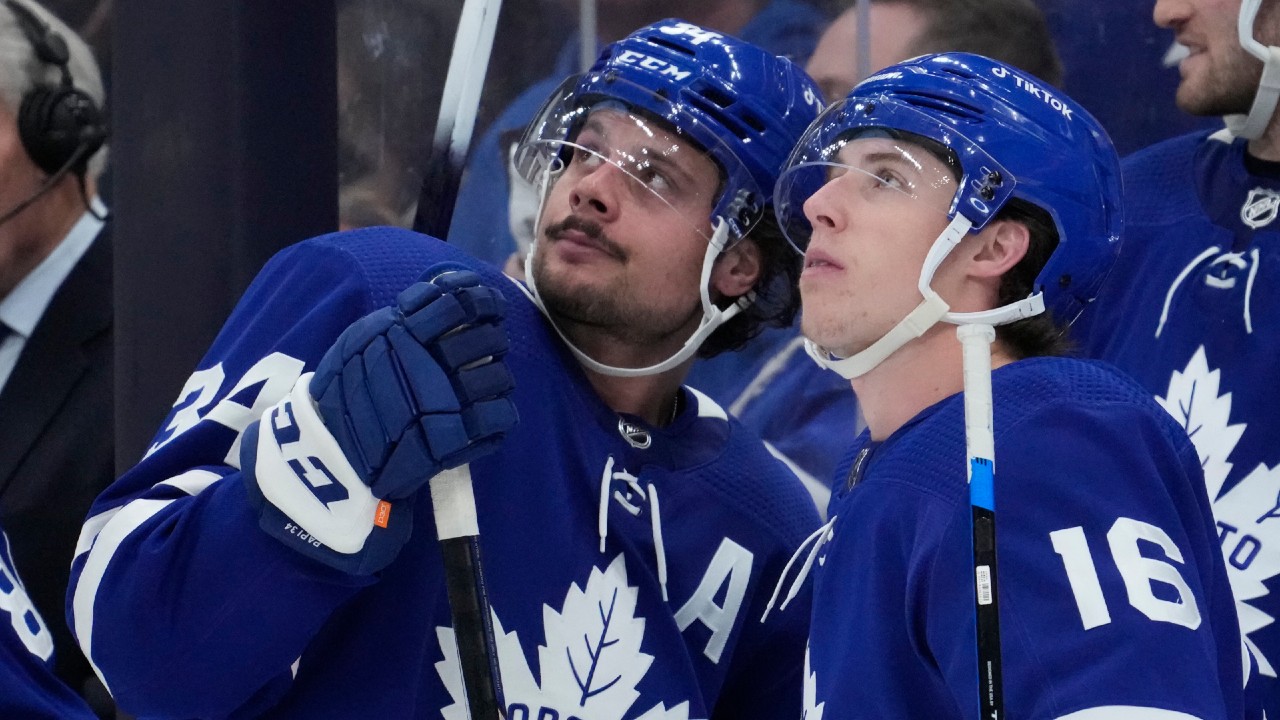
The matchup game did not factor in nearly as much as it did in Games 3 and 4 in Tampa. Perhaps you could say that Jon Cooper getting his matchups did limit the Leafs’ top line slightly, but they certainly weren’t muzzled like the last two games in this building. The best three forwards for the Leafs in xGF% at 5v5 in this one were the top line of Matthews, Mitch Marner, and Michael Bunting, who produced plenty of chances, including the near game-winner in OT just moments before Tampa scored.
Matthews scored a goal and the line owned the xG and high-danger chance battles while on ice despite facing the stiffest competition. It was a really impressive showing from this group, and if they can carry that compete level over to Game 7 — where Sheldon Keefe will be able to isolate more favorable matchups — they could tip the series in the Leafs’ favour.
John Tavares and William Nylander didn’t decisively win their minutes, as they were often given the most difficult matchups, but they did produce. Tavares had two massive goals and the two had a great shift when the game was tied late in the third period as well.
Alex Kerfoot joined this line from time to time and he had the most up-and-down game of anybody. He had several great chances to score but came up short on all of them. He then committed two major mistakes, the turnover leading to the first goal and the penalty creating the 5v3.
I cut him some slack on the turnover because TJ Brodie was out of position, drifting into the center ice area for no apparent reason. That said, it was another instance of the Leafs getting too fancy (no-look drop passes in 4v4), which has cost them this series. On the other hand, the penalty was a disaster.
I love that Kerfoot was giving it his all on the PK, but in that situation — up one goal in the third period — I don’t think you can be that aggressive shorthanded. When I saw him engaging that aggressively in the corner, I was more worried about him accidentally hauling down Hedman as opposed to accidentally high sticking him, but either way, I’d much rather have had him apply pressure but not go all-in with such wild abandon.
The fourth line was a bright spot in this game; not only did Jason Spezza get a primary assist on a goal, but that unit owned the scoring chances while they were on the ice. Colin Blackwell had a lot of jump yet again. I thought it was a really nice showing, as they outplayed the Tampa fourth line for one of the only times in this series.
I really had no issues with any of the Toronto D pairings. Jake Muzzin and Brodie graded out the best in xGF% but every member of the defense was over 50% at 5v5 in Natural Stat Trick’s data. I thought the Leaf defenders played great fundamental defense in the defensive zone, tying up sticks, blocking shots, and breaking out pretty clean yet again (not as clean as Game 5, but miles better than Games 3-4).
It feels pretty notable that none of the goals in this game were scored off of cycle plays where the defense got hemmed in. Two were solo rush chances off NZ giveaways, one was a 5v3 goal, and the OT winner was on a partial-odd man re-entry. When the Leafs were set up in their own end at 5v5, they were excellent defensively, which is why it hurts so much that they didn’t get a chance to close the game out at 5v5.
Jack Campbell had a decent game, but a better one would’ve won the series. Both of the first two goals are ones where the Leafs made bad giveaways to set up opportunities against, but they were also goals that Campbell could’ve come up with saves on. He got a piece of Palat’s shot, and then the Cirelli spin-o-rama was not a great goal to surrender, either.
The nature of Cirelli’s move is tough because it disguises the release, but it also wasn’t a dagger of a shot. Campbell made two big stops on breakaways in Game 5, and if he had come up with one in this game, the Leafs probably win it. I don’t put the third or fourth goals on him, though, and Natural Stat Trick’s data has him at -0.47 GSAx for the game. In other words, the difference between “fine” and “great” was stopping one of those two goals.
Storylines for Game 7
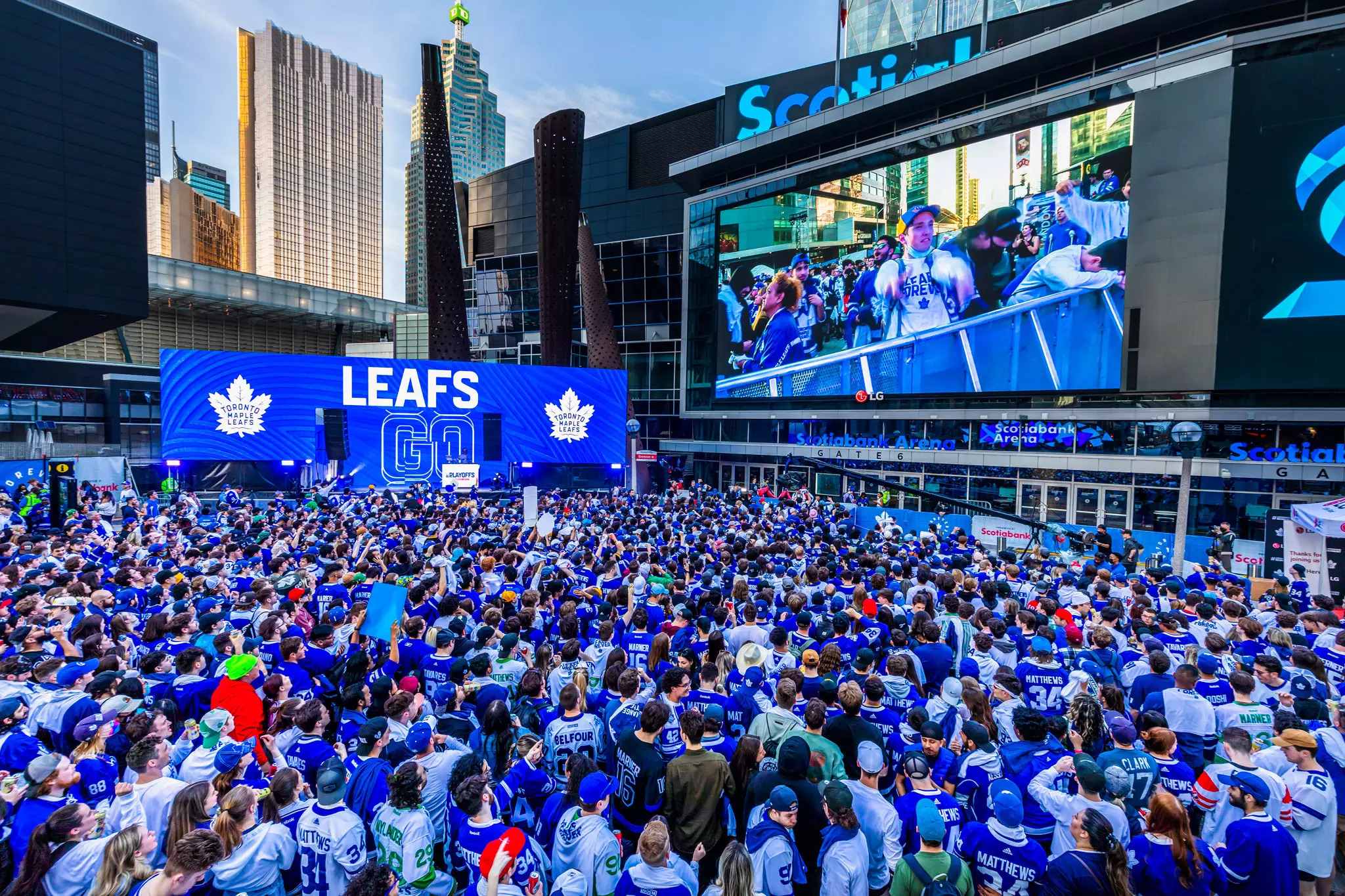
1. The series now moves back to Toronto, where the Leafs will again have last change and the ability to pick their matchups. I noted earlier that they didn’t have as big of an effect in this game as previously, but it is still a factor. The ability of Keefe to potentially scheme some mismatch opportunities for his top line will be a big storyline to follow, no question. The home team has won four of six games in this series, and matchups are part of it.
Another part of it is the home crowd, which seemed to will the Leafs forward in Games 1 and 5. How raucous are they? After all, the last time the Maple Leafs played a Game 7 at home in front of a full crowd, they won it back in 2004.
2. The goaltending matchup will perhaps be one of the top talking points entering Game 7. Vasilevskiy outdueled Campbell in Game 6, although both were beatable, and now we come up against the most impressive Vasilevskiy stat of all: He has pitched a shutout in five straight series-clinching games (including two in the Stanley Cup Final). When it’s time to get a series done, he has become a monster in the last two playoffs.
The Leafs haven’t had any issues with him in this series, and so seeing if Game 7 Vasilevskiy proves to be a different beast will be among the most important storylines to watch. An early goal could be the key to getting him out of his rhythm, but obviously, the Leafs will need Campbell to be sharp at the other end. He mostly was in Game 6, but an even better performance may be required to bring this home.
3. Speaking of an early goal, it bears repeating that the Leafs have now trailed 2-0 in every potential series-clinching game going back to 2019. They haven’t scored first in a series-clinching opportunity since Game 6 of 2019, and if they can find a way to do so in Game 7, it has the potential to alter the feel of the game and allow the Leafs to play with the lead. Something like Game 3 perhaps is most optimal — a couple of goals early to solidify control of the game and dictate its pace and terms. Though the Leafs have battled back to take a lead in the last two games, it’s hard not to feel like the first goal in Game 7 is of humongous importance.
4. Penalties are another key plotline to follow here. The Leafs got just one power play in Game 6, while the Lightning got three including that devastating 5v3 opportunity. I have to imagine there are not going to be many whistles in Game 7, but how many there are and the distribution of them have the potential to swing the outcome.
The Leafs could play another great game at 5v5 but lose again because they didn’t do enough on special teams. These two teams are so evenly matched that anything could potentially swing the outcome of the game and one PPG could prove decisive either way. If, say, only one power play is given to each team, taking advantage of that one shot could make or break the game.
5. Much like Game 6, the only storyline remains whether the Toronto Maple Leafs can close out a series. They’re now 0/8 in the Matthews/Marner era… could they really go 0/9? Is it even possible to lose a winner-take-all game in five straight years? The entire hockey world will be watching with wide eyes on Saturday night precisely for that reason.
As I said at the top, though, the Leafs did not mail it in here in Game 6 as they had in so many potential clinchers before. They played a good game, but due to a couple of mistakes and some bad breaks, they weren’t quite able to get it done. The challenge is bringing the same 60-minute effort on Saturday night. If the Leafs can do it, they’ve got a good shot to win.
Last season, the Leafs came so close in Game 6 OT, but they were completely flat in Game 7. That’s the mental hurdle the Leafs need to overcome. They can’t be dejected or feel like they missed their chance in Game 6. They need to shake it off, show up, and start anew.
This has been a great series between two terrific hockey teams and whoever loses will not deserve it. Both of these teams are among the five best in the NHL, in my opinion. Even playing a great game may not be enough given Vasilevskiy’s excellence in past clinching games, but the Leafs have to at least play a great game to see if it will be enough. You can’t control how the opponent will play, but you can control how you play. That ought to be Sheldon Keefe’s message for Game 7.












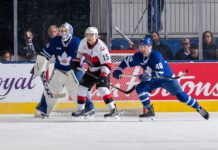





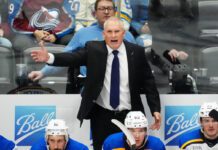


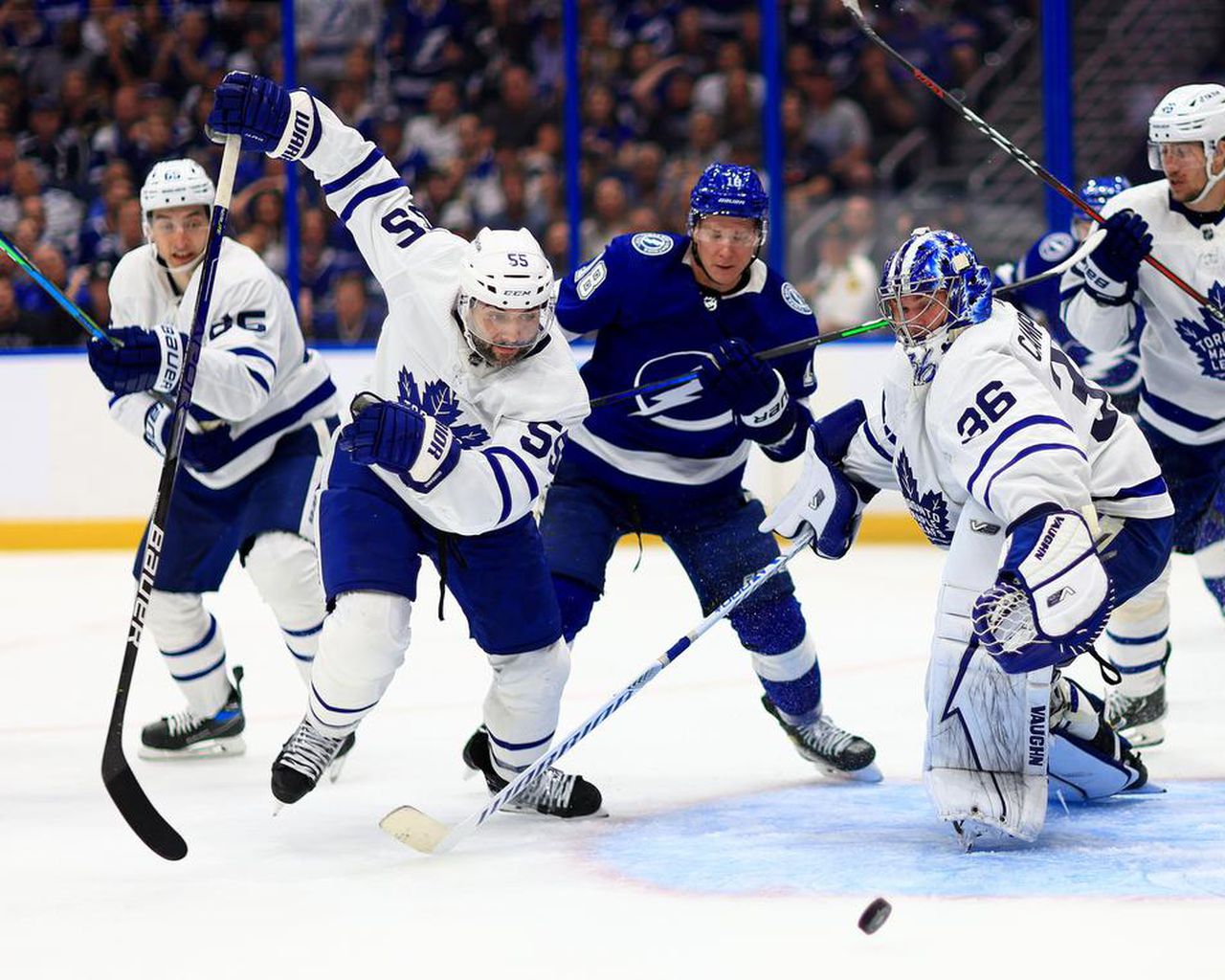








![New Leaf Anthony Stolarz on the opportunity in Toronto: “In Florida, I knew my role as a backup… Now, [Joseph Woll] and I are competing for starts… As a goalie, that’s all you can ask for” Anthony Stolarz, Stanley Cup win, now Maple Leaf](https://mapleleafshotstove.com/wp-content/uploads/2024/07/anthony-stolarz-sc-100x70.jpg)
